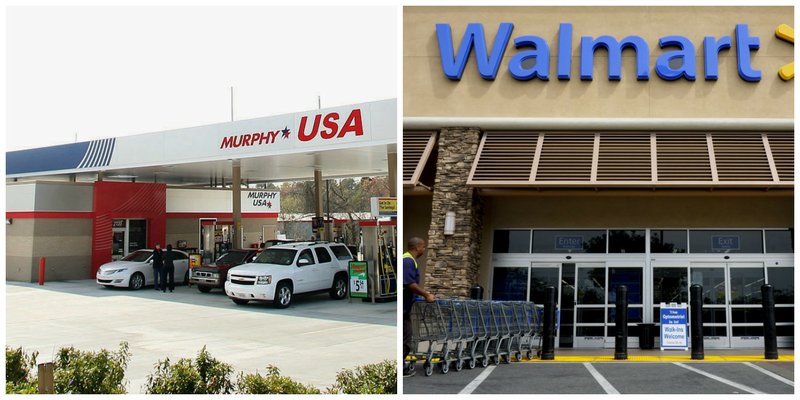The future break between Murphy USA Inc. and Wal-Mart Stores Inc. on new fuel stations increases the odds that the two will become competitors as they expand to new markets, an analyst said Tuesday.
The move, which was unexpected by investors and sent Murphy USA's stock tumbling Tuesday, raises many questions about future growth in the fuel sector for both companies, said Benjamin Brownlow, an analyst with Raymond James and Associates.
"The fact that Wal-Mart chose not to go down the path and continue expanding with Murphy -- it just creates that big question mark of what is Wal-Mart going to do," Brownlow said.
But, he said, "Given Wal-Mart's size and past success, they have the capabilities in place to compete in retail. It could be a challenge to Murphy on future sites."
Murphy USA, based in El Dorado, announced on Monday the shift in its relationship with Wal-Mart, saying the company will no longer acquire property from Wal-Mart for future gas stations.
Chief Executive Officer Andrew Clyde said in an interview that Murphy USA will continue to work with Wal-Mart at established locations and that the company will finish building about 60 gas stations on property acquired from Wal-Mart in a 2012 deal between the companies.
Murphy USA, which separated from Murphy Oil Corp. and became its own public company in 2013, is a retail fuel and convenience store company.
In 2012, the company entered into its most recent agreement with Wal-Mart to build more than 200 Murphy USA fuel stations at Wal-Mart Supercenters. Of Murphy USA's 1,300 stations, about 1,100 are at Wal-Mart Supercenters.
Clyde said the change in the relationship between the two companies was made by Wal-Mart.
Murphy USA approached Wal-Mart in 2015 and "offered to build out remaining Supercenters for them," he said.
"Wal-Mart has spent time over the last year evaluating that and at the end of the day they decided that this is something they want to do themselves," Clyde said, adding "We felt we had a strong offer."
Randy Hargrove, a spokesman for Wal-Mart, said "We've had a good relationship with Murphy through the years. They'll continue to operate the stations. We're appreciative of the relationship."
Murphy USA shares plunged almost 9 percent Tuesday morning on the news that the company wouldn't partner with Wal-Mart on new gas station locations in the future. The company announced the change Monday after markets closed.
The drop eased slightly after Murphy USA said it would hold a conference call today with investors to discuss its growth going forward and the share-repurchasing program it intends to use to help with the plans.
Clyde said Murphy USA has been preparing for different scenarios regarding its relationship with Wal-Mart and has plans for future growth. This includes building 60 to 80 fuel stations in 2016 and 2017.
The company's board also has approved up to $500 million that Murphy USA can use to repurchase stock or allocate capital toward growth opportunities independent from Wal-Mart.
The company's stock ended the day down 3.5 percent at $54.85.
"Investors that were solely focused on the accelerated growth of Wal-Mart were disappointed," Brownlow said about Murphy USA's stock performance Tuesday.
"The primary visible growth vehicle has been with Wal-Mart," he said about Murphy USA. "Even their independent sites ... have been built up basically piggybacking or adjacent to Wal-Mart sites."
Wal-Mart's shares didn't take a hit from the announcement (they gained 0.87 percent Tuesday) because the fuel stations are a small part of Wal-Mart's business, but analysts said the Bentonville retailer has yet to reveal its strategy for growing its fuel operations.
Because fuel is a low-margin business, it is possible that Wal-Mart sees an opportunity to improve its margins by handling its own gas stations, said Brian Yarbrough, an analyst with Edward Jones.
He said it's likely the retailer views gas stations in the same way it views pharmacy and other offerings that attract shoppers.
"At the end of the day, it's not a good margin business, but it can help you drive regular traffic," Yarbrough said.
"I wonder if that's not Wal-Mart's take on it," he said. "They've got experience in this business with Sam's. Margins are slim, but if you're attracting shoppers into your parking lot for a fill-up, your chances of getting them into the stores are better."
Adding its own fueling stations has been part of Wal-Mart's strategy dating back to at least 2013.
Former Wal-Mart U.S. CEO Bill Simon told analyst in 2013 that fuel would increasingly be "a major piece from a convenience perspective for the stores as we add them to the pipeline."
Other than the Murphy USA stations, Wal-Mart has "another couple hundred" of its own fueling stations across the country, Hargrove said. Sam's Club, Wal-Mart's warehouse retail chain, has more than 530 clubs that sell gas to members.
Hargrove added that Wal-Mart will open 24 stores nationwide today that have fuel stations.
Brownlow said the partnership between the two companies was the "obvious lower-risk avenue for Wal-Mart to choose," calling the relationship "mutually beneficial to both parties."
That's why investors are uncertain about future growth, particularly in how it affects the relationship between Murphy USA and Wal-Mart going forward, he said.
Clyde said Murphy USA growth plans include building larger-format stores and smaller express stations. He said that while property for the stations will not be acquired from Wal-Mart as it has in the past, Murphy USA still will buy locations near Wal-Mart stores.
This sets the stage for a Murphy USA-Wal-Mart competition by increasing the possibility that both will have stations near a Supercenter targeting the same customers.
"I do view Murphy as a more sustainable low-cost supply structure," Brownlow said when asked about who would fare better in the competition.
"The question becomes more of how much is Wal-Mart willing to subsidize its future fuel program," he said. "Despite Wal-Mart's size, I feel like from a supply standpoint Murphy still has more of advantage on fuel."
Business on 01/27/2016
